不定式做宾语和v-ing做宾语的动词知识总结
英语动词-ing形式作主语和宾语
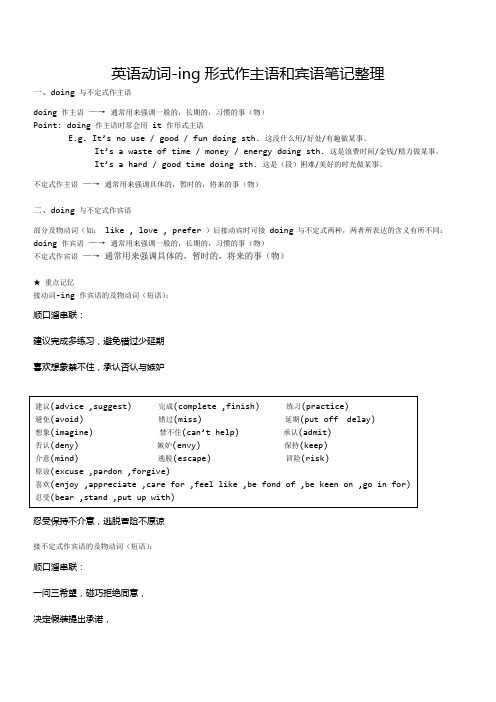
英语动词-ing形式作主语和宾语笔记整理一、doing与不定式作主语doing作主语—→通常用来强调一般的,长期的,习惯的事(物)Point: doing 作主语时常会用 it 作形式主语E.g. It’s no use / good / fun doing sth. 这没什么用/好处/有趣做某事。
It’s a waste of time / money / energy doing sth. 这是浪费时间/金钱/精力做某事。
It’s a hard / good time doing sth. 这是(段)困难/美好的时光做某事。
不定式作主语—→通常用来强调具体的,暂时的,将来的事(物)二、doing与不定式作宾语部分及物动词(如:like , love , prefer)后接动宾时可接doing与不定式两种,两者所表达的含义有所不同:doing作宾语—→通常用来强调一般的,长期的,习惯的事(物)不定式作宾语—→通常用来强调具体的,暂时的,将来的事(物)★重点记忆接动词-ing作宾语的及物动词(短语):顺口溜串联:建议完成多练习,避免错过少延期喜欢想象禁不住,承认否认与嫉妒忍受保持不介意,逃脱冒险不原谅接不定式作宾语的及物动词(短语):顺口溜串联:一问三希望,碰巧拒绝同意,决定假装提出承诺,渴望设法买得起,计划准备不失败。
接动词-ing / 不定式作宾语的及物动词:①动词love , like , hate等后跟动名词和不定式作宾语,但接动名词表示经常性的情况,接不定式表示具体的动作②动词begin , start , continue等后既可跟不定式,又可以跟动-ing形式宾语,意义基本相同③一些动词后既可跟动名词做宾语又可以跟不定式作宾语,但意义上有很大差别:三、动名词逻辑主语以及其他问题①动名词作主语时,形容词性物主代词one’s与名词所有格前置作动名词的逻辑主语,具体形式为:one’s doing②动名词作宾语时,由形容词性物主代词one’s,人称宾格与名词所有格作动名词的逻辑主语,具体形式为:vt. One’s doing③逻辑主语位于非谓语动词的最前面:E.g. his not being late.④动词-ing的肯定形式:一般时:主动:doing 被动:being done完成时:主动:having done 被动:having been done⑤动词-ing的否定形式:not + 动词-ingnot + having done not having been done(注意:not 一定位于肯定形式的最前面)⑥在need , want , require 等动词后接动名词,即用主动形式表示被动意义:need/want/require doing = need/want/require to be done。
非谓语动词做宾语

2.只能跟V.ing形式做宾语的动词
• admit , advise, allow, avoid, consider, delay, enjoy, escape, excuse, finish, imagine, mind, miss, permit, practise, suggest • be tired of, be used to(习惯), can’t help(but), depend on, feel like(想要), give up, insist on, look forward to, pay attention to, put off, set about(开始), stick to(坚持), succeed in
三、做定语的区别
• 不定式做定语:指将来的动作,如果不定式 为不及物动词,须在其后加上适当的介词。 eg: He has nothing to worry about. V.ing 形式做定语:①表示名词的用途,多 为前置定语,如a flying suit. ②强调动作正 在进行或经常性的动作或状态,与被修饰的 名词在逻辑上含主谓关系(主动)。如:a flying bird.
I continue to feel sick.( 心理活动)
3). “需要”:want need require
•{
+v.ing 与主语在逻辑上含动宾关系(被动)= to be done + to do 与主语在逻辑上含主谓关系 (主动)
Eg. My bike needs repairing.= to be repaired ( 被动) She needs to talk to you.( 主动)
3.两种皆可
• 1).“喜好”:love, like, hate, prefer, dislike..
非谓语动词作宾语补足语的用法及区别-六级语法
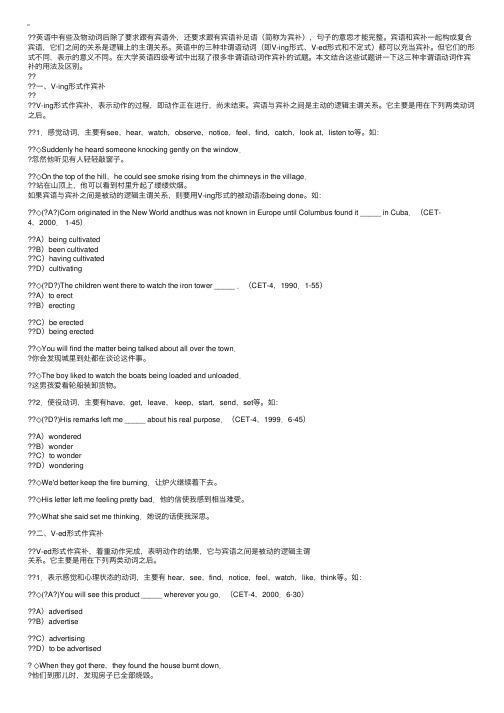
英语中有些及物动词后除了要求跟有宾语外,还要求跟有宾语补⾜语(简称为宾补),句⼦的意思才能完整。
宾语和宾补⼀起构成复合宾语,它们之间的关系是逻辑上的主谓关系。
英语中的三种⾮谓语动词(即V-ing形式、V-ed形式和不定式)都可以充当宾补。
但它们的形式不同,表⽰的意义不同。
在⼤学英语四级考试中出现了很多⾮谓语动词作宾补的试题。
本⽂结合这些试题讲⼀下这三种⾮谓语动词作宾补的⽤法及区别。
⼀、V-ing形式作宾补V-ing形式作宾补,表⽰动作的过程,即动作正在进⾏,尚未结束。
宾语与宾补之间是主动的逻辑主谓关系。
它主要是⽤在下列两类动词之后。
1.感觉动词,主要有see,hear,watch,observe,notice,feel,find,catch,look at,listen to等。
如:◇Suddenly he heard someone knocking gently on the window.忽然他听见有⼈轻轻敲窗⼦。
◇On the top of the hill,he could see smoke rising from the chimneys in the village.站在⼭顶上,他可以看到村⾥升起了缕缕炊烟。
如果宾语与宾补之间是被动的逻辑主谓关系,则要⽤V-ing形式的被动语态being done。
如:◇(?A?)Corn originated in the New World andthus was not known in Europe until Columbus found it _____ in Cuba.(CET-4,2000. 1-45)A)being cultivatedB)been cultivatedC)having cultivatedD)cultivating◇(?D?)The children went there to watch the iron tower _____ .(CET-4,1990.1-55)A)to erectB)erectingC)be erectedD)being erected◇You will find the matter being talked about all over the town.你会发现城⾥到处都在谈论这件事。
动词后接动词不定式/动名词作宾语用法小结
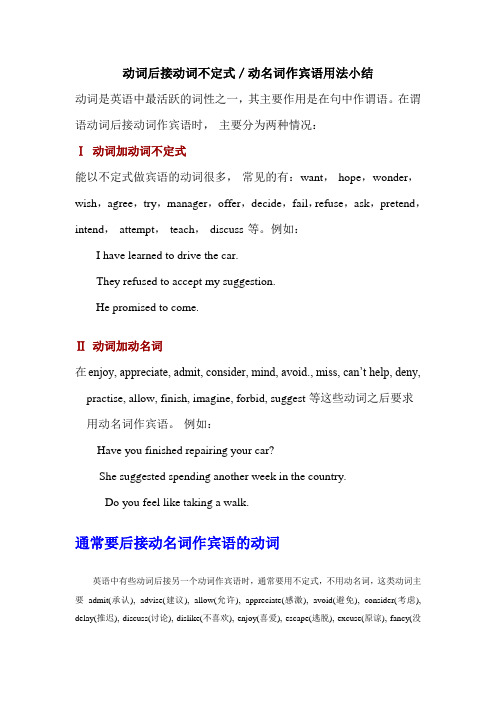
动词后接动词不定式/动名词作宾语用法小结动词是英语中最活跃的词性之一,其主要作用是在句中作谓语。
在谓语动词后接动词作宾语时,主要分为两种情况:Ⅰ动词加动词不定式能以不定式做宾语的动词很多,常见的有:want,hope,wonder,wish,agree,try,manager,offer,decide,fail,refuse,ask,pretend,intend,attempt,teach,discuss等。
例如:I have learned to drive the car.They refused to accept my suggestion.He promised to come.Ⅱ动词加动名词在enjoy, appreciate, admit, consider, mind, avoid., miss, can’t help, deny, practise, allow, finish, imagine, forbid, suggest等这些动词之后要求用动名词作宾语。
例如:Have you finished repairing your car?She suggested spending another week in the country.Do you feel like taking a walk.通常要后接动名词作宾语的动词英语中有些动词后接另一个动词作宾语时,通常要用不定式,不用动名词,这类动词主要admit(承认), advise(建议), allow(允许), appreciate(感激), avoid(避免), consider(考虑), delay(推迟), discuss(讨论), dislike(不喜欢), enjoy(喜爱), escape(逃脱), excuse(原谅), fancy(没想到), finish(完成), forbid(禁止), forgive(原谅), give up(放弃), imagine(想像), keep(保持), mention(提及), mind(介意), miss(没赶上), pardon(原谅), permit(允许), practise(练习), prevent(阻止), put off(推迟), report(报告), resist(忍住), risk(冒险), stop(停止), suggest(建议), understand(理解)等。
只能跟V-ing做宾语的动词口诀

• 完成练习值得忙碌(finish ,practice ,be worth ,be busy) • 继续习惯禁止放弃(keep/continue ,be used to ,forbid ,give up) • 考虑建议不禁想象 (consider ,suggest ,can’t help ,imagine ) • 承认喜欢思念避免介意 (admit ,enjoy/like ,miss(思念,错过), avoid ,mind)
只能Байду номын сангаасV-ing做宾语的动词口诀
在英语学习中,我们会发现动词之后可 以跟名词,代词作宾语,也可以跟从句, 但还有些动词后再跟动词的某种形式作 宾语,如 to do (不定式)或 doing(动名 词),有的动词只能跟 to do ,有的动词 只能跟 doing,在教学中,我把只能跟 doing 的动词总结了一下,变成口诀如 下,以供同仁指导。
练习2
• 用动词的适当形式填空: • 1. He has been in Hainan for five years, so he has been used to -----( live) here. • 2. You should be careful enough to avoid ---( make) mistakes. • 3. I think the movie is worth -----(see). • 4. Hearing the sad news, he couldn’t help -----(cry). • 5. Would you mind my -----(turn down ) the radio? •
练习1
• • • •
• • • •
填空: •going to Paris for vacation 1. He is considering---------------------------(去巴黎度假) 2. Why notgive up smoking. It’s bad for your health. --------3. What’s she doing? She’s busy -----------------------making a plan for next -term (做下学期的计划). listening to the concerts on weekends 4. Her mother enjoys------------------------(周末听音乐会). speaking English 5. You’d better practice -------------------(说英语) every day in order to improve your spoken English.
动词不定式作主语、宾语、定语、状语用法详解
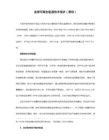
3)后接不定式和V-ing形式作宾语均可,且没有大的区别的动词。常见动词有: start, begin, continue等。
A. this B. that C. its D. it
9. Last summer I took a course on ________ .
A. how to make dresses
B. how dresses be made
C. how to be made dresses
3. "疑问代词、疑问副词 + 不定式"常常用作动词或介词的宾语。例如:
I don't know where to spend my holiday. 我不知该去哪儿度假。
Have you decided when to marry?你决定什么时候结婚了吗?
[高考题例]
3. She pretended ________ me when I passed by.
当表语形容词说明不定式的逻辑主语具有某种品质时,常用"It's...of sb. to do sth."。例如:
It's very kind / nice of you to help me。感谢你的帮助。
当表语形容词说明不定式具有某种特征时,应使用 "It's ...for sb. to do sth."。例如:
[高考题例]
12. Tom kept quiet about the accident ________ lose his job.
(完整版)不定式和动名词做宾语
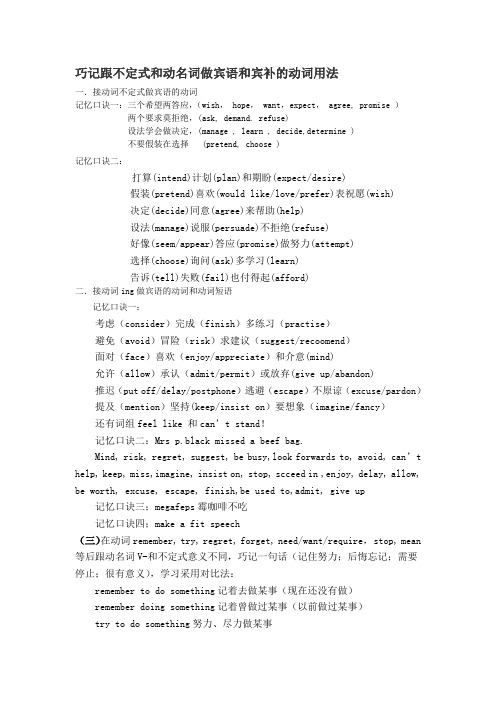
巧记跟不定式和动名词做宾语和宾补的动词用法一.接动词不定式做宾语的动词记忆口诀一:三个希望两答应,(wish, hope, want,expect, agree, promise )两个要求莫拒绝,(ask, demand. refuse)设法学会做决定,(manage , learn , decide,determine )不要假装在选择 (pretend, choose )记忆口诀二:打算(intend)计划(plan)和期盼(expect/desire)假装(pretend)喜欢(would like/love/prefer)表祝愿(wish)决定(decide)同意(agree)来帮助(help)设法(manage)说服(persuade)不拒绝(refuse)好像(seem/appear)答应(promise)做努力(attempt)选择(choose)询问(ask)多学习(learn)告诉(tell)失败(fail)也付得起(afford)二.接动词ing做宾语的动词和动词短语记忆口诀一:考虑(consider)完成(finish)多练习(practise)避免(avoid)冒险(risk)求建议(suggest/recoomend)面对(face)喜欢(enjoy/appreciate)和介意(mind)允许(allow)承认(admit/permit)或放弃(give up/abandon)推迟(put off/delay/postphone)逃避(escape)不原谅(excuse/pardon)提及(mention)坚持(keep/insist on)要想象(imagine/fancy)还有词组feel like 和can’t stand!记忆口诀二:Mrs p.black missed a beef bag.Mind, risk, regret, suggest, be busy,look forwards to, avoid, can’t help, keep, miss,imagine, insist on, stop, scceed in ,enjoy, delay, allow, be worth, excuse, escape, finish,be used to,admit, give up 记忆口诀三;megafeps霉咖啡不吃记忆口诀四;make a fit speech(三)在动词remember, try, regret, forget, need/want/require, stop, mean 等后跟动名词V-和不定式意义不同,巧记一句话(记住努力;后悔忘记;需要停止;很有意义),学习采用对比法:remember to do something记着去做某事(现在还没有做)remember doing something记着曾做过某事(以前做过某事)try to do something努力、尽力做某事try doing something试着做某事(看能否达到预期的结果)stop to do something开始做某事(停下正在做的事,开始做另一事)stop doing something停止做某事(停止正在做的事)regret to do something对将来做的事感到遗憾、惋惜regret doing something对已经做过的事感到后悔mean to do something打算,想,意图…mean doing something意味着want/require/need to be done某事需要做want/require/need doing某事需要做(这时动名词和主语之间有动宾关系,如: The room needs cleaning/needs to be cleaned)can’t help to do sth.不能帮助做某事can’t help doing sth.禁不住做某事动词接不定式和动名词意思一样双方一旦开始(begin, start),无论喜欢与否(like, prefer , hate, dislike)都要继续下去(continue),都不能打算忽视开始的爱(intend, attempt, propose, neglect,commence, love)(四)请牢记在下列固定句式中,动词用V-ing式:There is no point arguing further. 再争辩下去没有意义。
V-ing的用法

V-ing形式是英语中非谓语动词的一种,它在句中可作主语、宾语、宾语补足语、表语和定语。
一、V-ing形式作主语表示泛指意义的行为。
谓语动词要用第三人称单数。
如:Saving money is a good habit.二、V-ing形式作宾语1. 有些动词后常跟V-ing形式作宾语,常见的有finish,practice,enjoy,suggest,keep,mind,advise等。
如:A young man practiced speaking English with Mr. Green just now.2. 有些动词词组或某些结构后常跟V-ing形式,常见的有give up,look forward to,feel like,pay attention to,put off,succeed in,be / get used to,can‘t help,be interested in,be afraid of,be busy等。
如:He gave up smoking in the end.注意:1. 某些动词后既可跟动词不定式,也可跟V-ing形式作宾语,但表达的意思不同,常见的有remember to do sth. (记住去做某事),remember doing sth. (记得做过某事);forget to do sth. (忘记去做某事),forget doing sth.(忘记做过某事);stop to do sth. (停下来去做另一件事),stop doing sth (停止做某事);try to do sth.(尽力做某事),try doing sth.(尝试做某事)等。
2. 还有一些动词后面既可跟动词不定式,也可跟V-ing形式作宾语,但表达的意思无多大区别,常见的有love,like,hate,prefer,begin,start,continue等。
三、V-ing形式作宾语补足语通常表示动作正在进行,能带这类结构的动词多为感官动词(如see,watch,hear等)以及某些使役动词(如keep,get 等)。
- 1、下载文档前请自行甄别文档内容的完整性,平台不提供额外的编辑、内容补充、找答案等附加服务。
- 2、"仅部分预览"的文档,不可在线预览部分如存在完整性等问题,可反馈申请退款(可完整预览的文档不适用该条件!)。
- 3、如文档侵犯您的权益,请联系客服反馈,我们会尽快为您处理(人工客服工作时间:9:00-18:30)。
动词接-to do和-ing的用法一、有些动词只能接不定式做宾语。
例如:help,hope,ask,refuse,decide,promise,wish,pretend,expect,learn,plan,manage,agree,fail,happen,seem等等。
例如: He refused to speak on the radio.注意:否定形式为not+ 不定式(to do)二、有些动词或短语只接动名词做宾语:例如:mind,finish,enjoy,suggest,consider,miss,keep(on),avoid避开,躲开,stand(忍受),allow ,practice,give up,put off,look forward to期待,期望,feellike想要做某事,prevent…from,阻止can't help禁不住,不由自主迫不及待,be/getused to ,be worth doing,be busy doing例如:His wife doesn't allow smoking inside the room and often advised him to give upsmoking.I'm looking forward to hearing from you soon.She doesn't feel like eating anything,being ill for a few days.三、后面加动名词与不定式时语义不同的1、remember to do 记得去做某事(未做)remember doing 记得做过某事(已做)2. go on to do 做了一件事后,接着做另一件事。
go on doing 继续做原来做的事。
3、try to do 尽力做某事。
try doing 试着做某事。
4. regret to do 遗憾,后悔没有做某事regret doing 遗憾、后悔做过某事5、forget to do 忘记要去做某事。
(未做)forget doing 忘记做过某事。
(已做)6. need to do 需要做某事(人做主语)need doing 需要做某事(物做主语) The bike is need repairing.7. stop to do 停止,中断做某事后去做另一件事。
stop doing 停止做某事。
8、can’t help to do 不能帮助做某事can’t help doing sth 情不自禁做某事9、mean to do 打算、想mean doing 意味着巧记一句话(记住继续努力;后悔的莫忘记;需要停止无意义的事)[小试牛刀]1. The boy planed ______in Shanghai, which made his father a little surprised.A. not to workB. to not workC. not workingD. working not2.—Would you mind ______ the door? —Of course not.A. I openingB. me to openC. for me to openD. my opening3. She ______ going out for a walk, but I’d rather stay at home watching TV.A. wantedB. askedC. hopedD. suggested4.After he had worked several hours, he stopped _____ a cup of coffee to refresh himself.A.to drink B.drinking C.drink D.drank5.Although swimming is his favorite sport, yet he doesn’t like _____ today.A.to swim B.swimming C.swim D.to have swim6.I forget ____ him the small change so I give him the money again.A. giveB. to giveC. givingD. gave7.The young plants and flowers need _____ carefully.A. looking afterB. to look afterC. being looked afterD. look after8.The boy wanted to ride his bike in the street, but his parents told him ______.A. not toB. not to doC. not do itD. do not to9.Please remember ____ your notebook here tomorrow.A. bringsB. broughtC. bringingD. to bring10. You look so tired. why not ___ a rest?A. stop to haveB. to stop havingC. stop havingD. to stop to have不定代词(一)两者:Both都(常位于be动词,助动词,情态动词之后,实义动词之前)either任何一个,neither都不三者:all都(同上)any任何一个,none都不neither 表示“两者都不”,neither…nor 意为“既不…又不…”。
either 表示“两者中的任何一个”,either…or…意为“或是…,或是…”①Neither of the answer is right.②I have neither time nor money to take a trip.③Either sentence is right. You can either go or stay.1. I didn’t like the cross talk. ______ of the actors was funny.A: Both B: All C: Neither D: Either2. ______ of us has read the story. A: Some B: Both C: All D: None3. There are many high-rises on ______ side of Huaihai Road. What a magnificent view!A: either B: neither C: both D: all4. Liu Xiang and Yao Ming are world-famous sports stars. ______ of them have seta good example to us.A: All B: Neither C: Both D: None5.. He has two flats in London. However, ______ is new.A: both B: neither C: all D: none6.. ______ of your answer is right. Please try a third time.A: Neither B: None C: Either D: Both7. ______ Kathy ______ Alice ______ at home last Sunday.A: Neither, nor, were B: Both, and, was C: Either, or, was D: Not only,but also, were8. I have a sister and two brothers. ______ of them are now in Japan.A: Both B: Everyone C: Either D: All9 . ______ of us likes this song in our class.A: None B: No one C: All D: Both10.--Wow! You’ve got so many clothes. --But _____ of them are in fashion now.A. allB. bothC. neitherD. none不定代词(二)复合不定代词由some. any. no .every. 和body. thing. one构成的合成词1. 复合不定代词作主语时,谓语动词使用单数第三人称形式Everybody in our class _______ interested in English.2.形容词修饰复合不定代词必须放在其后I have ______________ ________________ to tell you.(一些重要的事情)We need one more helper. Can you find anyone else?3.一般地something 用于肯定句;在否定句,疑问句,条件状语从句中用a nything ;但something 用在疑问句中是表示建议或请求,期望得到肯定回答(如在很有礼貌的问某人要吃什么和喝什么时,这是一种特殊的用法).1.You look hungry .Don' t you have ____ to eat?A. something B .anything C. nothing D. everything2. Do you have ______ to eat? I’m hungry.A. something B .anything C. nothing D. everything3.Are you hungry? Would you like ________ to eat?A. anything else B .something else C .else something D. else anything。
